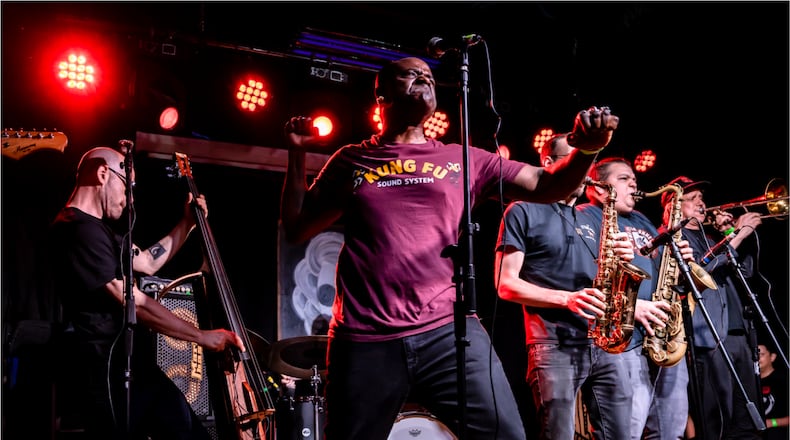But what are music reporters, really, except inept at following directions?
Mephiskapheles will be headlining Skadoom Fest — a two-day punk/metal/ska crossover festival — on Friday, Aug. 8 at Yellow Cab Tavern. Psychobilly band The Goddamn Gallows will headline Saturday, Aug. 9. Other acts throughout the weekend include The Operators, Little Foot, The Strains, Marijuana Johnson, and Caught Dead.
In the early nineties, after changing the name from Skatterbrains to Mephiskapheles — a portmanteau of “ska” and “Mephistopheles,” of Faustian legend — the band adopted the satanic gimmick. Its debut 4-song cassette was titled “The DEMOn,” and a pentagram, re-engineered with an “M,” would eventually be co-opted as its insignia. The full-length, “God Bless Satan,” debuted in 1994.
So, when I went against advice and asked frontman Andre Worrell, bassist Michael Bitz, and trombonist Greg Robinson if they were actually Satanists, the intention was to understand if the gimmick came from a real place, or if it was truly just a gimmick. It was to understand what initially drew the band toward its satanic sheen.
“Like in rock and roll, it’s sort of built into it. It’s just another ideology. No one’s going to come in your sleep and get you,” said Worrell, who also goes by The Nubian Nightmare. “It’s just poking fun at everything, and that’s one of the things that we poke fun of, while at the same time agreeing with some of the anti-tenets it proposes.”
Robinson confirmed, and brought a conclusion to the ill-timed question, that no, none of them are members of the Church of Satan.
The origins of ska and reggae are rough around the edges. Mephiskapheles reinterpreted two-tone and rocksteady sounds through a rock and roll lens, and pushed it even further with metal influences. The oft-overdriven guitars counter the West Coast Tommy Bahama brightness of some ‘90s ska bands, and the brass really manages to capture the spirit of what hell would feel like.
The sound is ostensibly based on New York in the nineties, and everything that was happening musically, from punk to jazz. It was all very serious. As Robinson points out, bands couldn’t get away with too much absurdity in New York back then because of the city’s intensity.
“We were sort of reacting to that, as well, saying we’re already in hell on earth here,” Robinson said. “As you can see, everything’s breaking down and there’s suffering all around. It’s like a satirical thing to get at serious subjects from another angle.”
Mephiskapheles takes the grit of New York City and translates it through satirical rock and roll, while also staying true to the roots of ska. Mark Wasserman, author of “Ska Boom! An American Ska & Reggae Oral History,” purports that Mephiskapheles was a transitional band from the ‘80s into third wave, stripping down the two-tone sound, darkening it, and injecting the New York scene of the time, which also included metal and hardcore.
Mephiskapheles is sometimes credited as the godfathers of third wave ska. But the band never subscribed to the third wave mindset — which includes bands like Reel Big Fish and The Mighty Mighty Bosstones — mainly because it transcends that sound, but also because it predates the label. Third wave was a term invented to describe the class of ‘91 bands, like Blue Meanies, Mustard Plug, The Slackers, and Mephiskapheles.
Before a recent show at Reggies in Chicago, Worrell proclaimed that the band is the “redheaded stepchild of every scene and we very much like it that way.”
“We’re always going to swim in our own lane,” Bitz added. “Whatever anybody wants to label as modern ska, we’re probably going to be different.”
Original ska is rooted in acoustic instruments. Lloyd Brevett always played upright bass in The Skatalites, just as Bitz does in Mephiskapheles. Despite the heavier tones the band explores, and the overall satanic gimmick, Mephiskapheles is still a ska band paying respect to its origins. It also has no corporate affiliations, and is DIY through and through.
The band recently recorded an album at the legendary Muscle Shoals Sound Studio in Alabama. A feature documentary will be accompanying it. A release date has yet to be set.
To further gel the seemingly strange ska/hell merger, as if there needs to be an explanation, Worrell has stated that Satan is the ultimate rude boy: rebellious, confident, street-smart, a little cheeky, and unafraid to challenge authority. I also imagine Old Scratch could throw a pretty good soirée.
“If you go to hell,” Worrell hypothesized, “wouldn’t you want to go to a party?”
I guess if I’m going to be there, I better be wearing my creepers.
Brandon Berry writes about the Dayton and Southwest Ohio music and art scene. Have a story idea for him? Email branberry100@gmail.com.
HOW TO GO
What: Skadoom Fest
When: 6 p.m. Aug. 8-9
Where: Yellow Cab Tavern, 700 E. 4th St., Dayton
Cost: $30 a day, $50 weekend pass
Tickets: CincyTicket.com/SkaDoomFest
About the Author


